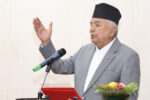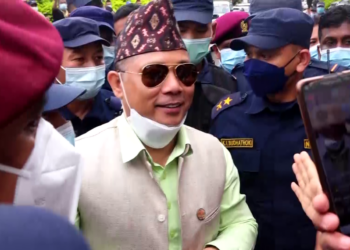KATHMANDU: The government has made it clear that Nepal’s foreign policy is guided by peace, friendship and goodwill meant for expanding its international relations to not let any of the powerful nations to make Nepal a playground.
The government has also countered the comments that China and United States (US) are willing to increase their influences after Nepal’s participation in China-proposed Belt and Road Initiative (BRI) for physical infrastructure development and the Millennium Challenge Corporation (MCC) to be implemented under the Indo-Pacific Strategy from the government of the US.
Talking to the foreign media persons at the Ministry of Foreign Affairs on Friday, Foreign Minister Pradeep Kumar Gyawali said that such baseless expressions were not significant at a time when the country was moving ahead, abiding by the fundamental principles of independent foreign policy, national interests of Nepal, greater good of Nepalis and overall socio-economic development.
Nepal won’t participate in any of the nation’s strategy and will never accept such programmes, he made it clear. There was no competition of India and China in Nepal and Nepal was not under the influence of other powerful nations. Nepal has no interest at all to participate in their military alliance, Minister Gyawali shared.
Minister Gyawali further made it clear that Nepal would not work under the influence of any foreign country nor make any agreement against country’s national interest. But, Nepal works in line with its non-aligned foreign policy and practices the notion of ‘amity to all, enmity to none’. In a bid to make the world community aware on the Nepal Visit Year 2020 and Sagarmatha Sambad, the Foreign Minister said before the journalists from noted Indian media that Nepal is not a playground of powerful countries.
Although Nepal receives generous assonance from foreign countries for its socioeconomic development, Nepal does not get influenced by the aid-providing countries, he mentioned.
Responding to the journalists’ query relating to Nepal’s role on SAARC, regional cooperation, peace and stability, various dimensions of Nepal-India relation and rising power as China and India, trans-border crime, the Minister reiterated that Nepal was for strengthening relations with the neighboring countries.
As Nepal has embraced non-aligned policy, UN Charter, and panchaseel, the relations with neighbouring countries are maintained accordingly. He expressed confidence that the bill on MCC would be endorsed by the federal parliament.
As the lone efforts of Nepal would be insufficient to cope up with poverty, terrorism and climate change, Nepal had no option but to work in unison with friendly countries. The feasibility study of Nepal-China trans-border railway was completed, he said, adding that Nepal was willing to reap benefit from the developments in China and India.
He further reminded that Kalapani is a longtime border problem. The border problems and disputes between Nepal and India will be resolved as per Sugauli Treaty and the spirit of the bilateral agreements and documents since then, the Minister viewed.
Nepal is always for the peaceful resolution of problems through diplomatic channel. India has also shown readiness for the resolution, he said, adding, “If India can resolve border problems with its other neighbours, I don’t believe India can’t resolve issues with Nepal.”
Expressing his confidence that the border issues between Nepal and India would be resolved under the able leadership of Prime Minister KP Sharma and Indian Prime Minister Narendra Modi, he was further confident the stable governments in both countries would utilize this opportunity.
Minister Gyawali was further confident that leaders of the both countries would be successful in taking Nepal-India ties to a new height during their leaderships. Gyawali was hopeful that the report prepared by the Eminent Persons’ Group (EPG) would be received by the Prime Ministers of the both countries in due time.
He said, “There is no question about accepting the unanimous report prepared by the EPG.” On a different note, he informed that the Indian side had taken Nepal’s request to reconsider on the IC Rs 70 million deposited in the Nepal Rastra Bank in positive matter but no response on it was received from the Indian side yet. But the concerned authorities of the both countries, according to him, were working on it to find a way-out.
‘Sagaramatha Sambad’ not an alternative to SAARC asked if the impending ‘Sagarmatha Sambad’ was going to be organized as an informal discourse in place of the SAARC summit that has been stalled for nearly five years, Minister Gyawali clarified that the Sagarmatha Sambad should not be viewed as the conclusion of the Foreign Minister-level meeting of SAARC-member countries held twice in New York, USA.
Furthermore, he said that the Head of the States and Heads of the Governments of all eight SAARC-member countries were determined to make SAARC further dynamic. “Nepal wishes the stalled SAARC summit be held at the earliest,” he said, reminding that the ‘Sagarmatha Sambad’ was not an alternative to the SAARC summit.









Comment